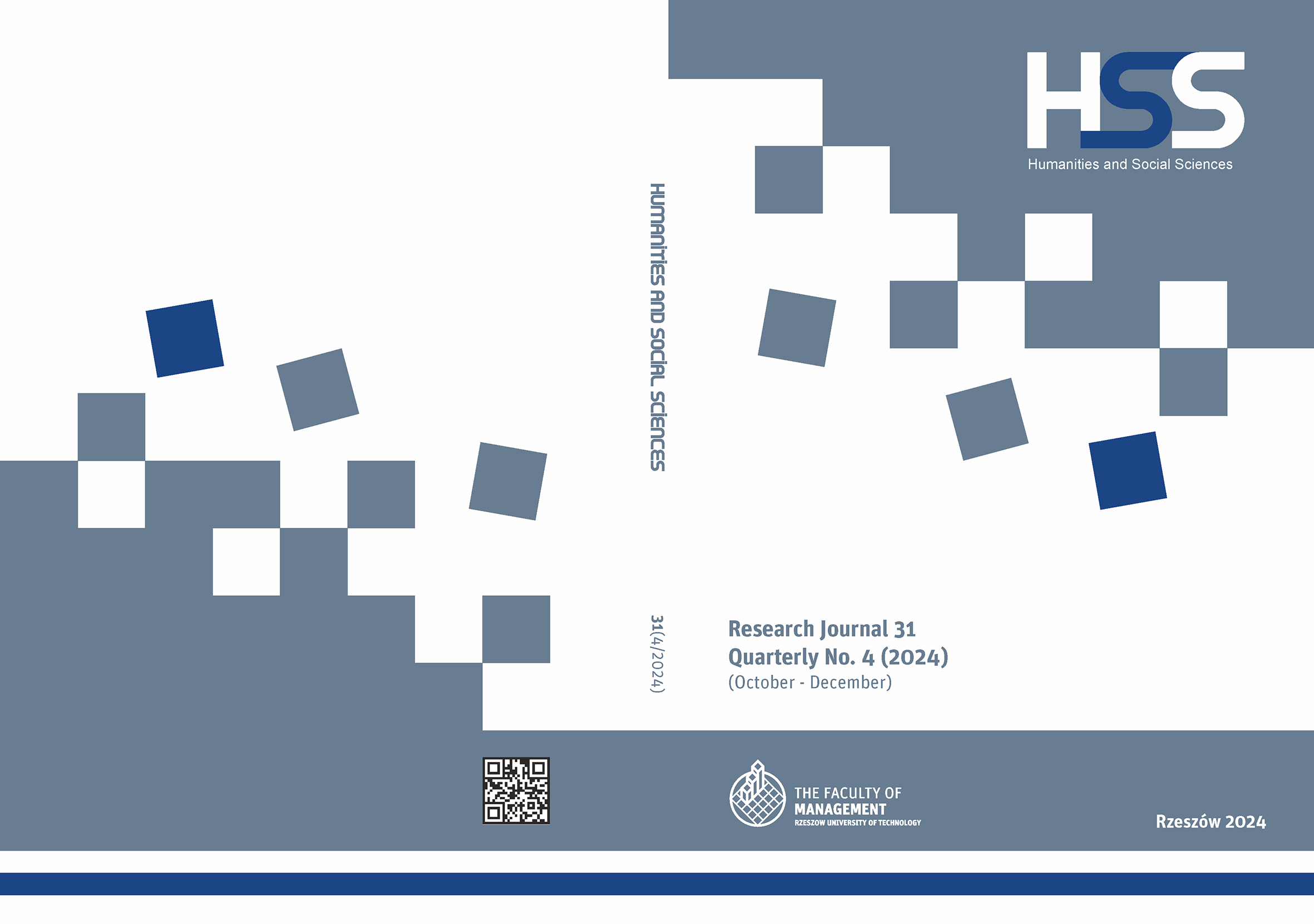Abstrakt
The globalization process, IT revolution, and technological progress in most industrial branches (e.g., pharmacy) have compelled businesses all over the world to adapt to survive. The role of human resources management has changed completely after the new needs of development induced by bringing in foreign labor employees. This paper presents the results of a study conducted in 2022 on employees of an international company. The study looks at how employees, with primarily technical backgrounds, from different countries and cultural backgrounds, develop specific social skills that allow them to efficiently communicate and perform with one another towards a common goal. For this reason, the study aimed to identify the opinions of employees and managers regarding the multicultural influence on outcomes in researched companies. The literature study, bibliometric analysis, a survey questionnaire, and structured interviews were used during the study. The employees pointed out that multicultural teams are more innovative and efficient, and they believe cultural diversity encourages growth and creativity but only if managed well. If not, it can lead to conflicts and a toxic work environment.
Bibliografia
Barak, M.E.M. (2022). Managing diversity: Toward a globally inclusive workplace. Sage Publications.
Bergh, R.., Plessis, Y.D. (2016). Exploring the role of motivational cultural intelligence in SIE women’s adjustment. “Journal of Global Mobility The Home of Expatriate Management Research”, 4(2). DOI: 10.1108/JGM-02-2016-0003.
Biggs, J., Tang, C. (2011). Train-the-trainers: Implementing outcomes-based teaching and learning in Malaysian higher education. “Malaysian Journal of Learning and Instruction”, 8.
Bournois, F. (1996). Industrial relations, source of economic and social performances of a company. “Performance et Ressources Humaines, Paris: Economica”.
Cagiltay, K., Bichelmeyer, B., Kaplan Akilli, G. (2015). Working with multicultural virtual teams: critical factors for facilitation, satisfaction and success. “Smart Learning Environments”, 2.
Canen, A.G., Canen, A. (2012). Challenging envy in organizations: multicultural approaches and possibilities. “Business Strategy Series”, Vol. 13, No. 5. DOI: 10.1108/17515631211264078.
Ding, X., Yang, Z. (2020). Knowledge mapping of platform research: a visual analysis using VOSviewer and CiteSpace. “Electronic Commerce Research”.
Earley, P. C., Ang, S. (2003). Cultural intelligence: Individual interactions across cultures. Stanford University Press.
Kilduff E., Cormican K. (2022). Do you really understand me? An analysis of cultural intelligence in global projects, “Procedia Computer Science”, Vol. 196. ISSN 1877-0509. DOI: 10.1016/j.procs.2021.12.081.
Gudykunst, W.B. (2003). Cross-cultural and intercultural communication. Sage.
Gurrey, O. (2016). The humanities between global integration and cultural diversity (Vol. 6). Walter de Gruyter GmbH & Co KG.
Harris, Lois R., Brown, Gavin T.L. (2019). Mixing interview and questionnaire methods: Practical problems in aligning data. “Practical Assessment, Research, and Evaluation”, Vol. 15, Article 1. DOI: 10.7275/959j-ky83.
Hienz, N., Engelhart, L. (2018). Management of a Cross Cultural Workforce: Case Study at Luleå Tekniska Universitet. Digitala Vetenskapliga Arkivet.
Kelly, A.V. (2009). The curriculum: Theory and practice. Sage.
Kitchenham, B. (2004). Procedures for performing systematic reviews. “Keele, UK, Keele University”, 33(2004).
Lamy E. et Lapoule P. (2012). Case Studies and Research in Management Science, in “Reframing Human Capital for Organizational Excellence”, Tojo Thatchenkery, GD Sardana, Academic References Series, Bloomsbury, Londres, New Dehli, New York, Sydney.
Lin, J.C. (2020). Understanding Cultural Diversity and Diverse Identities. “Quality Education”. DOI: 10.1007/978-3-319-69902-8_37-1.
Lisak, A., Erez, M. (2009, February). Leaders and followers in multi-cultural teams: Their effects on team communication, team identity and team effectiveness [In:] Proceedings of the 2009 international workshop on Intercultural collaboration.
Loue, S. (2022). Diversity, Cultural Humility, and Professionalism. In: Diversity, Cultural Humility, and the Helping Professions. Springer, Cham. DOI: 10.1007/978-3-031-11381-9_9.
Lu, J.G., Swaab, R.I., Galinsky, A. D. (2022). Global leaders for global teams: Leaders with multicultural experiences communicate and lead more effectively, especially in multinational teams. “Organization Science”, 33(4).
Matei, A. (2020). European Union-Model of Global Integration-Identity Through Cultural Diversity. “Theoretical and Practical Research in Economic Fields (TPREF)”, 11(22).
Misoc, I. (2017). The effects of cultural diversity on team performance: A comparison between the performance of monocultural teams and the performance of multicultural teams in tourism organizations. “International Journal of Academic Research in Business and Social Sciences”, 7(7).
Mohammadian, H.D. (2017). International Cross-Cultural Management. Fachhochschule des Mitt elstands GmbH, Bielefeld.
Nathan, M., Lee, N. (2013). Cultural Diversity, Innovation, and Entrepreneurship: Firm-Level Evidence from London (October 1, 2013). “Economic Geography”, Vol. 89, Issue 4. DOI: 10.1111/ecge.12016.
Pathak, S. (2011). Managing cultural diversities in internationalization of business. “International Journal of Enterprise Computing and Business Systems”, 1(1).
Rockstuhl, T., Ng, K.Y. (2015). The effects of cultural intelligence on interpersonal trust in multicultural teams [In:] Handbook of cultural intelligence. Routledge.
Schein, E.H. (1985). How culture forms, develops, and changes. Gaining control of the corporate culture.
Shan, J., Konishi, M., Pullin, P., Lupina-Wegener, A. (2021). Effects of cultural intelligence on multicultural team effectiveness: the chain mediation role of common ingroup identity and communication quality. “Journal of Theoretical Social Psychology”, 5(4). DOI: 10.1002/jts5.115.
Stahl, G.K., Maznevski, M.L., Voigt, A., Jonsen, K. (2010). Unraveling the effects of cultural diversity in teams: A meta-analysis of research on multicultural work groups. “Journal of international business studies”, 41.
Suedekum, J., Wolf, K., Blien, U. (2014). Cultural diversity and local labour markets. “Regional Studies”, 48(1).
Tandé, A. (2017). Implementing a diversity policy through public incentives: Diversity Plans in companies of the Brussels-Capital Region. “Journal of Ethnic and Migration Studies”, 43(10).
Zhu, J., Liu, W. (2020). A tale of two databases: the use of Web of Science and Scopus in academic papers. “Scientometrics”, 123. DOI: 10.1007/s11192-020-03387-8.


